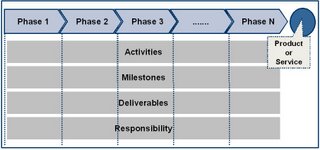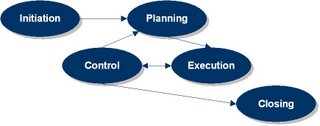Product
The project's material outcome. It maybe a service, event or any material object (e.g., a machine, computer system, new drug, building, etc.). The product includes all necessary aspects of the deliverable (e.g., training, documentation, etc.).
Product Life Cycle
The time from the delivery of a product until the product is withdrawn from use or sale. There may be many projects during the product life cycle.
Project
An effort to provide a product or service within finite time and cost constraints.
Program
A suite of related projects and ongoing operational activities managed as a whole.
Project Life Cycle
The full set of activities from the beginning to the end of a project. Generally associated with a set of phases which are determined based on the major parts of project performance (e.g., requirements definition, design, construction, deployment) and the need for control by the client organization (checkpoints for Go/No Go decision making).

Phase
A grouping of activities in a project required to meet a major milestone by providing a significant deliverable such as a requirements definition or product design document. A project is broken down into a set of phases for control purposes. The phase is usually the highest level of breakdown of a project in the WBS.
Deliverable
Any item produced as the outcome of a project or any part of a project. The project deliverable is differentiated from interim deliverables that result from activities within the project. A deliverable must be tangible and verifiable. Every element of the WBS (activity or task) must have one or more deliverable.
Milestone
A point in time when a deliverable or set of deliverables is available. Generally used to denote a significant event such as the completion of a phase of the project or of a set of critical activities. A milestone is an event; it has no duration or effort. It must be preceded by one or more tasks (even the beginning of a project is preceded by a set of tasks, which may be implied).
Objective
An objective is something to be achieved. In Project Management, the objectives are the desired outcomes of the project or any part of the project, both in terms of concrete deliverables and behavioral outcomes (e.g., improved service, more money, etc.)
Activity
Any work performed on a project. May be synonymous with task but in some cases it may be a specific level in the WBS (e.g., a phase is broken down into a set of activities, activities into a set of tasks). An activity must have duration and will result in one or more deliverables. An activity will generally have cost and resource requirements. See Task.
Task
A piece of work requiring effort, resources and having a concrete outcome (a deliverable). A task may be of any size (a project is a very large task). Sometimes the term is used to denote a piece of work at a particular level in a Work Breakdown Structure (WBS) hierarchy - e.g., a phase is broken into a set of activities, and an activity into a set of tasks. Except for this hierarchical usage, activity is synonymous with task.
Sub-task
A breakdown of a task into the work elements that make it up. A task must be broken down into at least two sub-tasks for a meaningful decomposition.
Project Management
The act of managing a project which requires the application of planning, team building, communicating, controlling, decision making and closing skills, principles, tools and techniques.
Project Manager
The person responsible for and accountable for managing a project's planning and performance. The single point of accountability for a project.
Stakeholder
Anybody and everybody with a "stake" in the project - clients, sponsors, performers, the general public and even the family and friends of direct participants can be considered stakeholders. Not to be confused with the guy that holds the stake when the vampire slayer slays the vampire.
 Initiating
InitiatingThe process of describing and deciding to begin a project (or phase) and authorizing the project manager to expend resources, effort and money for those that are initiated.
Planning
The process of establishing and maintaining the definition of the scope of a project, the way the project will be performed (procedures and tasks), roles and responsibilities and the time and cost estimates.
Executing
1. The process of coordinating the people and other resources in the performance of the project.
2. The actual performance of the project.
Controlling
The process of monitoring, measuring and reporting on progress and taking corrective action to ensure project objectives are met.
Closing
The process of formally accepting the results of a project or phase and bringing it to an orderly end, including the archiving of project information and post project review.
No hay comentarios:
Publicar un comentario